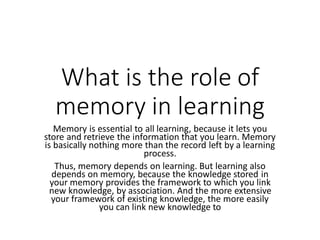
What is the role of memory in learning
- 1. What is the role of memory in learning Memory is essential to all learning, because it lets you store and retrieve the information that you learn. Memory is basically nothing more than the record left by a learning process. Thus, memory depends on learning. But learning also depends on memory, because the knowledge stored in your memory provides the framework to which you link new knowledge, by association. And the more extensive your framework of existing knowledge, the more easily you can link new knowledge to
- 2. Human memory is not a unitary process. Research suggests, that, at the psychological level, various types of memory are at work in human beings. It also seems increasingly likely that these various systems bring different parts of the brain into play. Types of memory can be classified in a number of ways, depending on the criterion used. With duration as the criterion, at least three different types of memory can be distinguished: sensory memory, short-term memory, and long-term memory.
- 3. The meaning of memory Memory is today defined in psychology as the faculty of encoding, storing, and retrieving information (Squire, 2009). Psychologists have found that memory includes three important categories: sensory, short-term, and long- term. Each of these kinds of memory have different attributes, for example, sensory memory is not consciously controlled, short-term memory can only hold limited information, and long-term memory can store an indefinite amount of information.
- 4. How are memories formed in brain The brain simmers with activity. Different groups of neurons (nerve cells), responsible for different thoughts or perceptions, drift in and out of action. Memory is the reactivation of a specific group of neurons, formed from persistent changes in the strength of connections between neurons. But what allows a specific combination of neurons to be reactivated over any other
- 5. How long do our memories Humans retain different types of memories for different lengths of time. Short-term memories last seconds to hours, while long-term memories last for years. We also have a working memory, which lets us keep something in our minds for a limited time by repeating it
- 6. The use of memory A memory is just like a human brain. It is used to store data and instructions. Computer memory is the storage space in the computer, where data is to be processed and instructions required for processing are stored. The memory is divided into large number of small parts called cells. Each location or cell has a unique address, which varies from zero to memory size minus one. For example, if the computer has 64k words, then this memory unit has 64 * 1024 = 65536 memory locations. The address of these locations varies from 0 to 65535. Memory is primarily of three types − Cache Memory Primary Memory/Main Memory Secondary Memory
- 7. Multiple different types of memory Memory is the ability to store and retrieve information when people need it. The four general types of memories are sensory memory, short-term memory, working memory, and long-term memory. Long-term memory can be further categorized as either implicit (unconscious) or explicit (conscious).
- 8. Why it's important to know memory Memory makes a fundamental contribution to our everyday mental experience. Complaints of memory failure are among the most common in clinics and hospital settings and these will continue to rise as life expectancy increases. Accordingly, a desire to improve memory and temper the anxiety associated with its loss, represent a significant societal concern.
- 9. Without memory, independent living can become very difficult if not impossible. Loss of memory not only means being robbed of your past, it can also be associated with problems inhabiting your imagination or contemplating the future as well as impairing your ability to navigate effectively in the environment, and even altering your perception of the world. Until we understand in much more detail precisely how memory works, effective rehabilitation for memory-impaired patients will be limited. Our aim with MEMO is to provide some of this missing knowledge.
- 10. What do teachers need to know about memory A knowledge of how we store and use information is invaluable for teachers in helping students to internalize lessons in long-term memory. One of the most important aspects of learning that might be least understood is human memory. We are tasked with passing on skills and knowledge to students—it’s the most important aspect of our job.
- 11. Guiding students to move their learning to long term The discussion about the future of work and skills is a hot topic in the current economic climate. With a trend towards remote work, rapid changes in technology, and the automation of repetitive jobs, the idea that current students will leave school and enter a job for life has become a thing of the past. Indeed, a student entering school today is likely to have as many as 15 different jobs in their lifetime. Therefore, it’s vital that we prepare them for this future by teaching them to continue learning throughout their lives.
- 12. Develop innovation skills Encourage critical thinking Encourage independent learning Set SMART goals Use technology Further reading
- 13. Attention Attention is one of the major components of memory. In order for information to move from your short- term memory into your long-term memory, you need to actively attend to this information. Try to study in a place free of distractions such as television, music, and other diversions.
- 14. Thank you